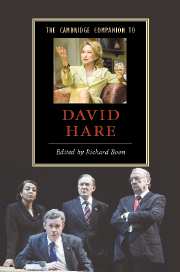12 - ‘To ask how things might have been otherwise . . .’
History and memory in the work of David Hare
from Part IV - Overviews of Hare
Published online by Cambridge University Press: 28 April 2008
Summary
ERNEST: Gilbert, you treat the world as if it were a crystal ball. You hold it in your hand, and reverse it to please a wilful fancy. You do nothing but rewrite history.
GILBERT: The one duty we owe to history is to rewrite it. That is not the least of the tasks in store for the critical spirit.
Oscar Wilde, The Critic as ArtistLAZAR: Did you know that sound waves never die? So every noise we make goes into the sky. And there is a place somewhere in the corner of the universe where all the babble of the world is kept.
David Hare, PlentyIn 1978, David Hare observed that 'It would be sad if this historical period had no chronicler', and one of the roles he has subsequently adopted has been to act as a witness of our times. Indeed, the theatre critic Michael Billington characterises Hare's work as demonstrating a 'sustained conviction that writers have a Balzacian duty to record what is going on around them', and Blake Morrison agrees that 'When future historians come to study the state of Britain in the late twentieth century, Hare will be the playwright they turn to first.' Hare's 'State of the Nation' trilogy of plays centring on the key public institutions of law, church and politics, which was staged at the National Theatre in the early 1990s, was significant in establishing his reputation in this respect; but some of his more recent work has also chimed with the rediscovery of 'documentary drama' and 'verbatim theatre', and the recognition of the potency of these forms as political theatre.
- Type
- Chapter
- Information
- The Cambridge Companion to David Hare , pp. 183 - 199Publisher: Cambridge University PressPrint publication year: 2007
- 1
- Cited by



